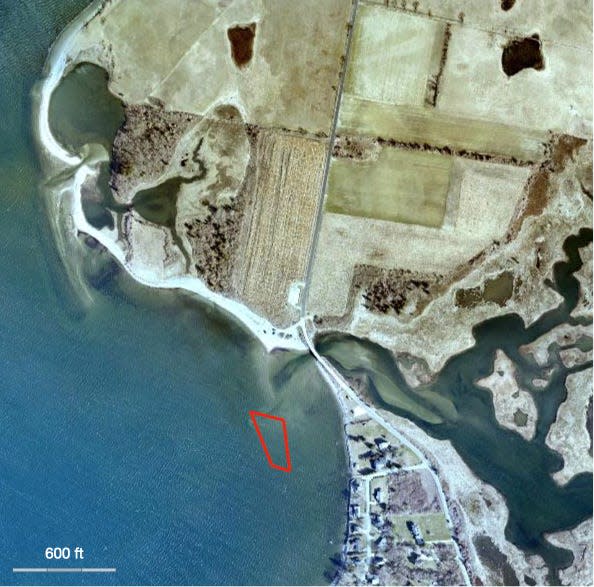Should a Tiverton cove be used exclusively for recreation? Oyster farm opponents think so
TIVERTON – If a piece of shoreline property is conserved as public open space, does that mean oyster farms are banned from the surrounding waters?
That's the argument being made by supporters of House Bill 7060, which would apply to one specific piece of the coastline: Tiverton's Sapowet Marsh Management Area.
For several years now, recreational fishermen and residents who live near the state-owned preserve have been trying to block a proposed oyster farm that would take up less than an acre of Sapowet Cove. The application, from brothers Sean and Patrick Bowen of Little Compton, remains pending before the state Coastal Resources Management Council.

Nonetheless, Rep. John Edwards, D-Tiverton, claimed on Wednesday at a State House public hearing that the bill is "not about the oyster farm."
What the bill would do
H 7060 would apply to "the water at the mouth of the marsh, for a distance of two thousand feet (2,000') from the bridge to Sapowet Point, measured in a southerly direction from the shoreline."
Those waters would be designated as open space and could be used only for "passive outdoor recreation," such as swimming, boating and fishing.
Similar restrictions would apply to the Sapowet management area, which could not be "commercially developed or in any way modified from its current undeveloped state." That land is already protected by virtue of being owned by the state Department of Environmental Management, and a portion of it is leased out for farming.
In a letter to members of the House committee on Municipal Government and Housing, DEM Director Terrence Gray suggested revising the bill to allow multi-year agricultural leases. Edwards said at Wednesday's hearing that he would make that change.
Sen. Louis DiPalma, D-Middletown, has introduced companion bill S 2415 in the Senate.
Supporters say cove should be reserved for recreation
The Bowen brothers are the only people seeking an aquaculture lease in the portion of the cove that the legislation is targeting. Their small farm would be about 500 feet from the Sapowet Management Area's boat launch.
Because the management area provides public access for activities such as fishing, kayaking and swimming, allowing even a tiny fraction of the cove to be used for a commercial enterprise would be inappropriate, supporters of the bill argued at Wednesday's committee hearing.
"This area was meant to be protected for fishermen, not to be leased away for a commercial aquaculture operation," argued Kenneth Mendez, one of the leading opponents of the oyster farm.
One Tiverton resident, David Rose, said the bill did not go far enough.
The restrictions on Sapowet Cove would have "the unwanted effect of amplifying commercialization pressures to the north of Sapowet Point," he said in written testimony. It would offer "extraordinary protection" to about 17 landowners south of Sapowet Point, but none for about eight landowners to the north.
Although Edwards insisted that his bill was not about the Bowens' proposed oyster farm, much of the public testimony on Wednesday was about their plan.
However, Jeanne De Souza, whose property overlooks the cove, pointed out that even if the Bowens were to withdraw their application, "something else could come along."
Opponents defend oyster farms; CRMC says bill would usurp authority
Speaking before the committee, Patrick Bowen suggested that the bill would also prevent commercial fishermen from putting down conch pots and lobster pots in the cove, and would essentially prioritize recreation over local food production.
He described the bill as "special-interest legislation" introduced on behalf of a small group of wealthy and politically influential people, and said that it would set a dangerous precedent.
Sean Bowen said that the legislation "epitomizes the 'Not In My Backyard' sentiment."
He pointed out that oyster farms are a sustainable sources of local seafood that benefit the environment – especially in areas that are dealing with high nitrogen levels due to increased development and fertilizer runoff.
But aquaculture is "increasingly coming under attack, locally and nationally, by wealthy property owners who are able to hire lawyers and petition legislators," he said.
CRMC Director Jeffrey Willis also expressed concern, noting that a hearing officer is reviewing the Bowens' contested application.
"Should this bill become law, it would effectively usurp the agency’s evidentiary hearing process and vetting of evidence that the governor expected when he appointed a hearing officer to the CRMC for matters such as this," he wrote.
This article originally appeared on The Providence Journal: Bill would ban oyster farms in Tiverton's Sapowet Cove